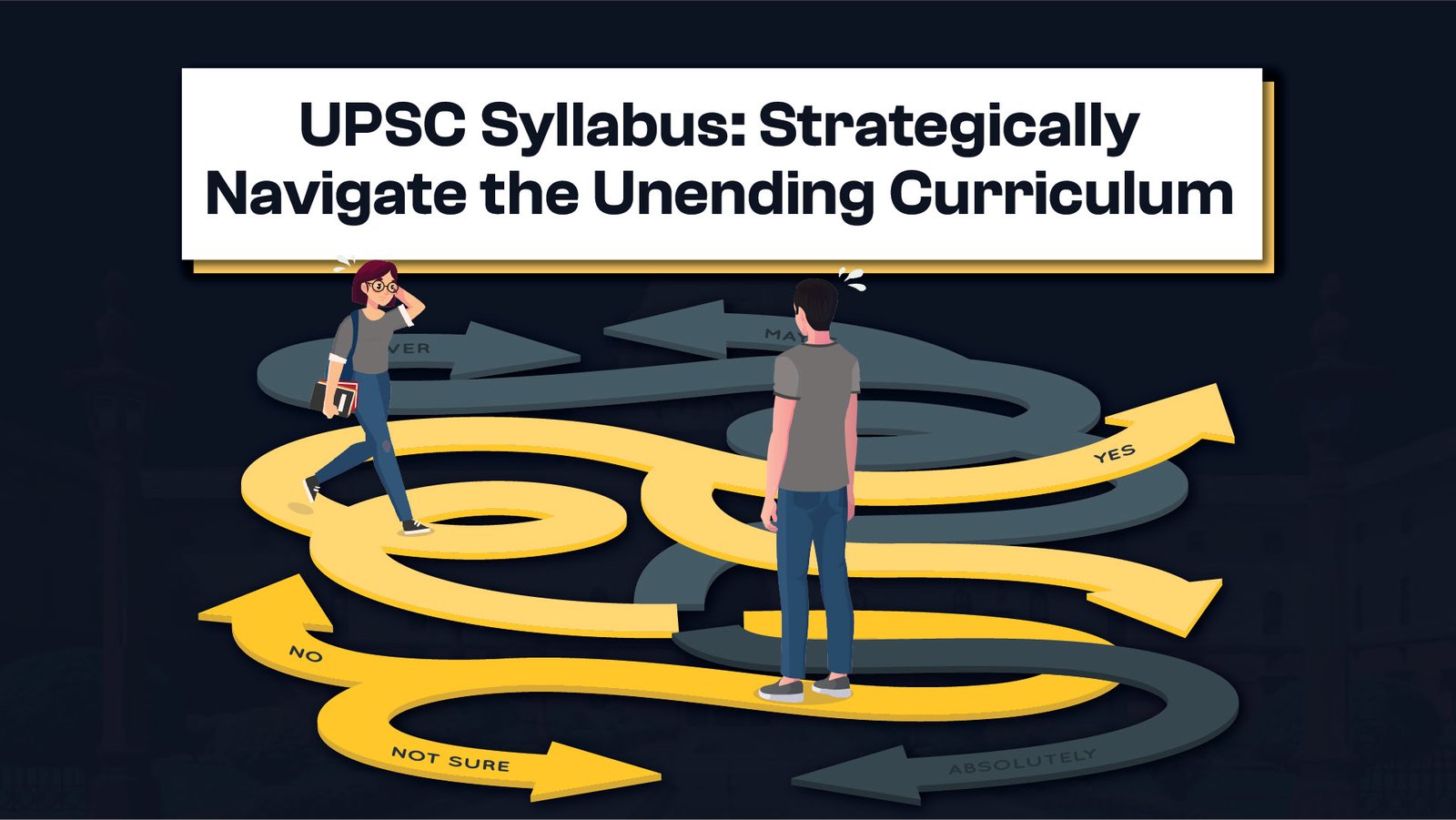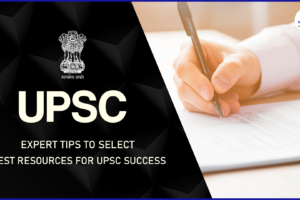
UPSC Syllabus: Strategically Navigate the Unending Curriculum
- Covering the UPSC CSE Syllabus is a task in itself.
- With proper planning and blueprint, success can be achieved.
The UPSC CSE syllabus seems unending, & only a strategic approach could cover it, knowing is only the first step. Aspirants find it difficult to cover the whole syllabus even once let alone revise. But it can be done if you follow a road map. In order to cover the whole syllabus, one must understand it like the back of the hand.
Understanding the ways to cover UPSC CSE Syllabus
For any aspirant dreaming to become an officer for the prestigious civil services, understanding the UPSC CSE syllabus is imperative. One must have to have a strategic approach to unlock the success in the examination. We at IAS Origin would help you with tailored strategies suitable for your learning needs.
It is known that the UPSC CSE Syllabus serves as a roadmap for an aspirant. Moreover it covers a plethora of topics and subjects that need to be covered. Without proper strategy it is nearly impossible to cover the whole syllabus. But with clear understanding, time management and prioritising the topics could unlock success.
Experts assert that the curriculum acts as a compass guiding candidates towards relevant study material and resources. Also help in avoiding the unnecessary and irrelevant topics that could consume valuable time and energy. By staying between the guilderails, one can streamline the preparation for better results.
How Can an Aspirant Cover the UPSC CSE Syllabus?
Experts have designed the UPSC CSE syllabus to evaluate an aspirant’s understanding of various topics. Awareness of the syllabus ensures that candidates do not overlook any crucial subject or point that might lead to a missed opportunity to succeed in one of the toughest and rewarding examinations.
Strategy dictated that the whole syllabus must be prioritised based on their weightage and relevance. Understanding the syllabus helps an aspirant to identify high-scoring areas and allocating more time to challenging topics. This scheme could maximise the chances of scoring a rank.
Studying for hours everyday without a proper plan or blueprint might lead to anxiety due to uncertainty. But a comprehensive knowledge of syllabus can boost confidence, reducing stress during the preparation phase and the actual examination. Moreover a customised study plan tailored to your need, impeccable time management, and understanding could be the key to success.
Syllabus for Preliminary Examination
The preliminary examination comprises two papers Paper I & II, each worth 200 marks and two hours to finish. Following are the details of the syllabus.
| Prelims Paper I (200 Marks/ 2 Hrs) | Prelims Paper II (200 Marks/ 2 Hrs) |
| Current Events of National & International importance. | Comprehension |
| History of India & Indian National Movement | Interpersonal Skills, Communication Skills |
| India & World Geography. (Physical, Social, Economic Geography of India & World) | Logical Reasoning & Analytical Ability |
| Indian Polity & Governance Constitution, Political System, Panchayati Raj, Public Policy, Etc. | Decision Making & Problem Solving |
| Economic & Social Development, Sustainable Development, Poverty, Inclusion, Demographics, Social Sector Initiatives, Etc. | General Mental Ability |
| General Issues on Environmental ecology, Biodiversity, Climate Change | Basic Numeracy (Class X level) |
| General Science | Data Interpretation (Class X level) |
After clearing the Preliminary examination, an aspirant becomes eligible to appear for the Phase II, Mains.
Syllabus for the Mains Examination
For the mains examination, an aspirant has to cover the following topics divided according to various papers.
| General Studies I: Indian Heritage & Culture; History & Geography of theWorld & Society |
| Indian Culture: Salient aspects of Art forms, Literature, Architecture from ancient to modern times. |
| Modern History: From middle of 18th century to Present |
| The Indian Freedom Struggle |
| Post Independence Consolidation & Reorganisation within the country. |
| World History: Events from 18th Century |
| Salient features of Indian Society, Diversity of India |
| Role of Women and Women’s organisation, population and associated issues, poverty and developmental issues, urbanisation: problems & remedies |
| Effect of Globalisation on the Indian Economy. |
| Social Empowerment, Communalism, Regionalism & Secularism. |
| Salient features of World’s Physical Geography |
| Distribution of Key Natural Resources around the World |
| Important Geophysical Phenomena like earthquakes, tsunamis, etc. |
For General Studies Paper II, the syllabus outline is as follows.
| General Studies II: Governance, Constitution, Polity, Social Justice & International Relations |
| Indian Constitution: Historical Underpinning, Evolution, Features, Amendments, etc. |
| Functions & Responsibilities of Union & States |
| Separation of Powers between various organisations, Dispute redressal mechanism & Institutions. |
| Comparison of Indian Constitutional Schemes to Other countries. |
| Parliament & State Legislature |
| Structure, Organisation & Functioning of Executive & the Judiciary |
| Salient features of Representation of People’s Act |
| Appointment of Various Constitutional Posts, Powers, Functions and Responsibilities. |
| Statutory, Regulatory and various Quasi-Judicial bodies. |
| Government Policies & Interventions for development across various sectors. |
| Development Processes & the Development Industry; like NGOs, SHGs etc |
| Welfare Schemes for Vulnerable Sections |
For Issues related to development and management of Social Sector or Services relating to Health, Education & Human Resources, following points need to be covered.
| Issues relating to Poverty & Hunger |
| Important aspects of governance, transparency and accountability, e-governance application models, citizen charters, etc. |
| Role of Civil Services in a Democracy |
| India & its neighbourhood relations |
| Bilateral, regional and Global grouping: Agreements and Others |
| Effect of Policies and Politics of developed and developing countries on India’s interest and Indian diasporas. |
| Important International institutions, agencies, their structure & mandates. |
The General Studies III comprises the following topics.
| General Studies III: Technology, Economic Development, Biodiversity, Environment, Security & Disaster Management |
| Indian Economy & related issues |
| Inclusive growth and issues arising from Indian Economy |
| Government Budgeting |
| Major crops, cropping patterns, etc. |
| Issues related to direct & indirect farm subsidies, MSPs, etc. |
| Food Processing & related industries in India’s scope & significance. |
| Effect of liberalisation of economy |
| Infrastructure: Energy, Ports, Roads, Airports Railway etc. |
| Investment Models |
| Science & Technology |
| Achievements of India in Science and Technology |
| Awareness in the fields of IT, Space, Computers Robotics, Nanotechnology, etc, |
| Conservation, environmental pollution 7 degradation, etc |
| Disaster & Disaster Management |
| Linkages between development & spread of extremism. |
| Role of external state & non-state actors in creating challenges in internal security |
| Challenges to internal security. |
| Security Challenges & their management in broader areas |
| Various security forces & agencies and their mandate. |
For General Studies Paper IV the syllabus layout is as follows.
| General Studies IV: Ethics, Integrity & Aptitude |
| Ethics & Human Interface |
| Human Values |
| Attitude: Content, Structure, Functions etc. |
| Aptitude & Foundational values of Civil Service |
| Emotional Intelligence Concepts |
| Contributors of moral thinkers and philosophers from India & World |
| Public/Civil Service values & Ethics in Public Administration |
| Probity in Governance |
| Case Studies. |
Here is a glimpse of what an aspirant has to learn & understand in order to become a civil servant. It seems unending and tough to cover without a proper strategy. However, with proper guidance from our experts you can not only cover the whole syllabus but might also have ample time to revise and get well versed with the topics of utmost importance. Thereby increasing your chances of success.



